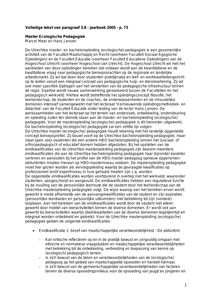De Utrechtse master- en bacheloropleiding (ecologische) pedagogiek is een gezamenlijke activiteit van de Faculteit Maatschappij en Recht (voorheen Faculteit Sociaal Agogische Opleidingen) en de Faculteit Educatie (voorheen Faculteit Educatieve Opleidingen) van de Hogeschool Utrecht (voorheen Hogeschool van Utrecht). De Hogeschool Utrecht wil met het aanbieden van deze opleidingen bereiken dat voldaan wordt aan de kwantitatieve en de kwalitatieve vraag naar pedagogische beroepskrachten op de regionale en landelijke arbeidsmarkt. Zij wil dat doen door studenten praktijknabij en leef- en werkkwaliteitengericht op te leiden vanuit een integraal concept van pedagogische hulp- en dienstverlening. Zij wil ook meer specifiek bijdragen aan het versterken van de pedagogische infrastructuur binnen de regio. Daartoe wordt nauwe samenwerking gerealiseerd tussen de Faculteiten en het pedagogisch werkveld. Hiertoe wordt betreffende het opleidingsconcept filosofie, het leerlandschap, de studenten en de coaches, de onderwijseenheden en de inhoudelijke domeinen intensief samengewerkt met het lectoraat Vernieuwende opleidingsmethodiek- en didactiek van de Faculteit Educatie onder leiding van de lector Hans Jansen.
DOCUMENT

De personeelspsychologie richt zich op het voorspellen van situationeel bepaalde succescriteria voor specifieke functies, maar wordt daarin beperkt door de relatief lage validiteit van traditionele persoonlijkheidsvragenlijsten. Gedrag varieert over situaties heen en traditionele persoonlijkheidsvragenlijsten trachten deze verschillen uit te middelen. Omdat een praktische oplossing voor de situationele kant van dit validiteitsprobleem nog ontbreekt, presenteert deze studie het concept ‘ecologische persoonlijkheidsschalen’. Ecologische persoonlijkheidsschalen zijn gecontextualiseerde schalen met een hoge ecologische validiteit. Ecologische validiteit verwijst hier naar de mate waarin de testresultaten een goede voorspeller zijn voor gedrag in een specifieke context of situatie. Ter illustratie wordt de ontwikkeling van een ecologische consciëntieusheidschaal voor promovendi besproken. Deze schaal blijkt significant gerelateerd aan promotiesucces en heeft incrementele validiteit ten opzichte van de traditionele Big Five schalen. De bevindingen tonen dat een ecologische aanpak kan bijdragen aan het verder verbeteren van de criteriumvaliditeit van persoonlijkheidsvragenlijsten.
DOCUMENT

In deze publicatie onderzoeken we hoe sociaal werkers zelf aankijken tegen eco-sociaal werk en de rol die zij in de klimaatcrisis en ecologische crisis zouden kunnen innemen. Zien zij het belang van in van eco-sociaal werk? Welke mogelijkheden zien zij en welke belemmeringen ervaren zij? In hoeverre zijn zij persoonlijk betrokken bij klimaatveranderingen, hoe vertalen zij deze betrokkenheid agogisch in hun werk en hoe zetten zij zich in voor het verduurzamen van hun organisatie? Welke ideeën hebben zij bij eco-sociaal werk en hoe vertalen zij dat in hun handelen? Het antwoord op deze vragen geeft weer waar sociaal werkers naartoe willen, hoever we staan en wat nodig is om een stap verder te zetten in de richting van eco-sociaal werk. Deze vragen vormen het startpunt voor dit onderzoek.
DOCUMENT

Ondanks de economische groei in Nederland staan we voor uitdagingen als een gezonde leefomgeving creëren, bestaanszekerheid waarborgen, klimaatverandering vertragen en een verantwoordelijke impact op toekomstige generaties. Sturen op "brede welvaart", rekening houdend met sociale, economische en ecologische waarden, wordt belangrijker voor gemeenten en beleidsstrategen in het bijzonder. Zij moeten brede welvaart integraal implementeren en brede welvaart in hun beleid omzetten in concrete keuzes en sturing. Gemeenten ervaren echter moeite bij de concrete implementatie. Brede welvaart is inhoudelijk complex en vereist continu koorddansen tussen verschillende belangen. Daarbij gaat er veel aandacht naar brede welvaart ‘hier en nu’ en blijven de belangen van toekomstige generaties (brede welvaart ‘later’) te vaak onderbelicht. In Europees verband, en op nationaal niveau is er tevens momentum om brede welvaart ‘later’ meer zichtbaar te maken. Als Europees Commissaris voor intergenerationele rechtvaardigheid heeft Micallef de opdracht om het belang van toekomstige generaties te dienen. Ook op nationaal niveau winnen de belangen van toekomstige generaties terrein zoals blijkt uit… Op lokaal niveau wordt directe invloed op brede welvaart voor huidige en toekomstige generaties concreet. Lokale publieke professionals spelen een sleutelrol in het bevorderen van welzijn en kwaliteit van de leefomgeving voor toekomstige burgers. Concernstrategen en afdelingshoofden in Nederlandse gemeenten vertalen brede welvaart naar beleid in de praktijk. Beleidsprofessionals krijgen door dit project voor het eerst in Nederland een concrete handreiking om brede welvaart integraal en voor toekomstige generaties in te richten. Door middel van de methode van backcasting en de generatietoets gaan we vanuit dit onderzoek brede welvaart ‘later’ concreet maken. We doen dit samen met 5 gemeenten, de provincie Noord-Brabant en kennispartners. Al vanaf de start participeren concernstrategen en afdelingshoofden van gemeenten in een rijk kennis- en leernetwerk om hierin te groeien. Dit project verschaft hen hiervoor de concrete tools: in co-creatie ontwikkeld en meteen ingezet.